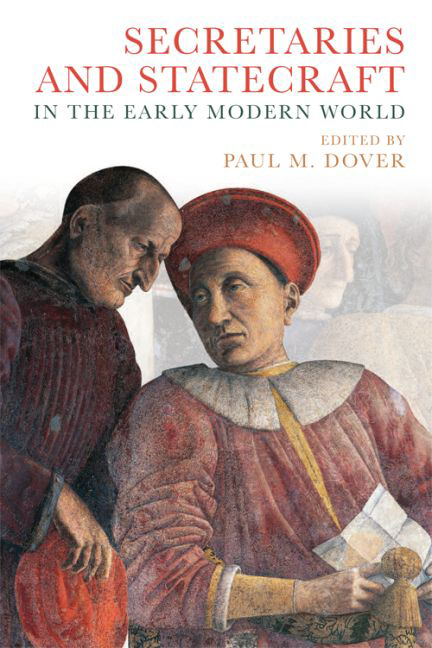Book contents
- Frontmatter
- Contents
- List of Contributors
- 1 Introduction: The Age of Secretaries
- 2 Records, Politics and Diplomacy: Secretaries and Chanceries in Renaissance Italy (1350–c. 1520)
- 3 Mercurino di Gattinara (1465–1530): Imperial Chancellor, Strategist of Empire
- 4 ‘This continuous writing’: The Paper Chancellery of Bernhard Cles
- 5 Parables and Dark Sentences: The Correspondence of Sir William Cecil and William Maitland (1559–73)
- 6 Axel Oxenstierna and Swedish Diplomacy in the Seventeenth Century
- 7 Statecraft and the Role of the Diplomat in Ducal Savoy: The Career of Alessandro Scaglia (1592–1641)
- 8 Richelieu, Mazarin and Italy (1635–59): Statesmanship in Context
- 9 The Learned Ideal of the Mughal Wazīr: The Life and Intellectual World of Prime Minister Afzal Khan Shirazi (d. 1639)
- 10 Reconsidering State and Constituency in Seventeenth-Century Safavid Iran: The Wax and Wane of the Munshi
- 11 Choreographers of Power: Grigorii Kotoshikhin, State Secretaries and the Muscovite Royal Wedding Ritual
- 12 Eberhard von Danckelman and Brandenburg's Foreign Policy (1688–97)
- 13 Chancellor of State: Prince Wenzel Anton Kaunitz, the Habsburg Foreign Office and Foreign Policy in the Era of Enlightened Absolutism
- Index
3 - Mercurino di Gattinara (1465–1530): Imperial Chancellor, Strategist of Empire
Published online by Cambridge University Press: 21 November 2017
- Frontmatter
- Contents
- List of Contributors
- 1 Introduction: The Age of Secretaries
- 2 Records, Politics and Diplomacy: Secretaries and Chanceries in Renaissance Italy (1350–c. 1520)
- 3 Mercurino di Gattinara (1465–1530): Imperial Chancellor, Strategist of Empire
- 4 ‘This continuous writing’: The Paper Chancellery of Bernhard Cles
- 5 Parables and Dark Sentences: The Correspondence of Sir William Cecil and William Maitland (1559–73)
- 6 Axel Oxenstierna and Swedish Diplomacy in the Seventeenth Century
- 7 Statecraft and the Role of the Diplomat in Ducal Savoy: The Career of Alessandro Scaglia (1592–1641)
- 8 Richelieu, Mazarin and Italy (1635–59): Statesmanship in Context
- 9 The Learned Ideal of the Mughal Wazīr: The Life and Intellectual World of Prime Minister Afzal Khan Shirazi (d. 1639)
- 10 Reconsidering State and Constituency in Seventeenth-Century Safavid Iran: The Wax and Wane of the Munshi
- 11 Choreographers of Power: Grigorii Kotoshikhin, State Secretaries and the Muscovite Royal Wedding Ritual
- 12 Eberhard von Danckelman and Brandenburg's Foreign Policy (1688–97)
- 13 Chancellor of State: Prince Wenzel Anton Kaunitz, the Habsburg Foreign Office and Foreign Policy in the Era of Enlightened Absolutism
- Index
Summary
In 1565 an agent of the Spanish empire in Italy complained about imperial overreach: ‘There are old men in Castile who believe we were better off when we had no more than that realm.’ He confessed that if the political situation had reverted to
that time when there was a king in Aragon and another in Naples, and a lord in Flanders, and another in Burgundy, and a duke in Milan […] it would be better for the kingdoms, although not for the authority and greatness of the kings.
Almost fifty years earlier, Mercurino di Gattinara (1465–1530) had helped to create this empire by orchestrating the Spanish domination of Italy. As grand chancellor of Holy Roman Emperor Charles V, Gattinara directed policy at the Spanish court from 1518 to 1530 and helped to construct the ideological foundations of a world empire.
Gattinara provided the Spanish empire with a cohesive vision of ‘universal monarchy’, a world united under the authority of one ruler. Fortified with source material from a variety of genres and historical eras including medieval biblical prophecy, Roman law and Christian humanism, he sounded an almost revolutionary call for peace, justice and religious reform. The ideological underpinning of empire complemented an active political agenda aiming toward one overriding goal: the military conquest of the Italian peninsula. This chapter examines the relationship between ideology and action as the grand chancellor guided the policy of Charles V. His combination of utopian idealism and raw power proved irresistible both to his ruler and to the subjects of the numerous domains he sought to bring into the Spanish empire.
As one among many chancellors working to consolidate state power in the early sixteenth century, he played a role similar to that of Antoine Du Prat (1463–1535) in France, Matthew Lang (1469–1540) in the Holy Roman Empire and Thomas Wolsey (1473–1530) in England. Enlarging the territories and military grandeur of their rulers, these men gained reputations as ruthless diplomatic negotiators and efficient administrators. They devoted their attention to the endemic warfare which dominated European affairs at that time.
- Type
- Chapter
- Information
- Secretaries and Statecraft in the Early Modern World , pp. 37 - 62Publisher: Edinburgh University PressPrint publication year: 2016

